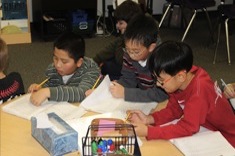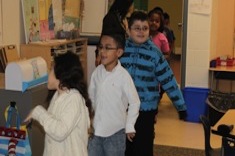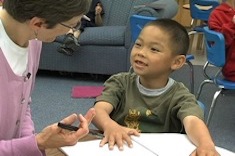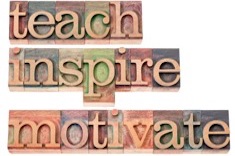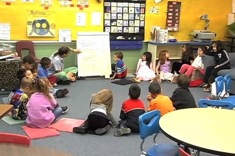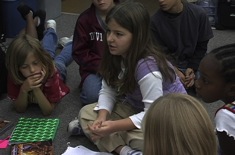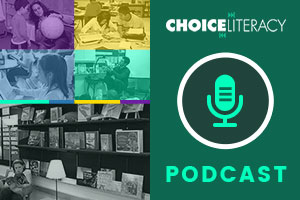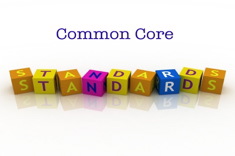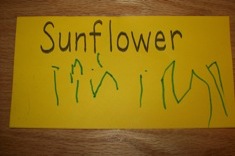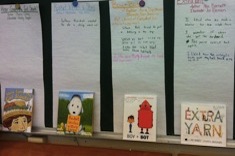Articles
Here is where you’ll find all the latest print features from our contributors. If you’d like to browse specifically by grade level, topic, or contributor, you can use the links in the right sidebar.
Latest Content
Happy Holidays from Choice Literacy and Pete the Cat
Wishing you and yours a totally groovy Pete the Cat holiday season.
I Have Two Pictures of Cindy. . .
Melissa Kolb writes about the importance of time and patience in meeting our goals with young learners — in this instance, a child who struggles to speak in her preschool classroom.
Choice and Reading Response
As more intermediate classrooms become departmentalized, grades 4-6 teachers find they are dealing with 80 or more reading response logs instead of 25-30 each week. Katherine Sokolowski tackles the issue of providing personal response to readers and still having time for everything else.
Teaching the Rule of Three to Writers
Aimee Buckner finds that teaching the rule of three to young writers adds variety to student texts.
Eliminating the Conga Line: Teaching Young Children About Strategic Thinking
Clare Landrigan and Tammy Mulligan manage to synthesize workspace cleanup, student independence, and a concrete analogy for strategy work in classrooms.
Hearing Carlos: Helping Young English Language Learners Develop Speaking and Listening Skills
Stella Villalba incorporates more speaking and listening activities into her primary classroom for English language learners.
Writers Inspiring Writers
Melissa Styger invites colleagues and family members into the classroom to share their writing process with students.
Rethinking Mrs. T Letters
Karen Terlecky reconsiders one of her favorite writing assignments.
Interactive Writing and Formative Assessment in Kindergarten
Not content to use assessments designed for older students, Mandy Robek combines interactive writing and formative assessments in her kindergarten classroom.
Teachers’ Night Out: Reclaiming Our Fearlessness
It’s hard to keep your teaching mojo high when standards are grinding you down. Gretchen Taylor is inspired by watching an aerial performer to consider harnesses and fearlessness in a new way.
Peer Conferring: The “Try It On” Phase
Amanda Adrian continues her series on how teachers can scaffold and model peer conferring. In this installment, Amanda uses the fishbowl technique with students.
Literacy in Content Areas: A Podcast with Penny Kittle
Penny Kittle talks with Franki Sibberson about how to help students grow as readers and writers throughout the curriculum.
Poems Facing Art: Ekphrasis
Shirl McPhillips considers ekphrasis (poetry inspired by art) in her own poetry and reflection.
Value-Added: Moving Assessments from “Inflicted” to “Student-Owned”
Gretchen Taylor looks closely at the superficial reading responses of one student, and then uses a mid-year assessment to challenge all of her middle school readers to think, talk, and write more deeply about their reading.
Poetry Friday in the Computer Lab
Mary Lee Hahn provides a wealth of web resources and practical suggestions for using technology for poetry instruction.
Owning Our Teaching: A Podcast with Vicki Vinton
Vicki Vinton chats with Franki Sibberson about teacher agency, student independence, and the Common Core in this podcast.
Poetry All Year Long
Ann Williams shares how she builds a love of poetry in her fourth-grade classroom all year long.
Evaluating the Literacy Classroom
Jennifer Schwanke remembers the awkward and stressful experience of being evaluated as a young teacher. In her work now as a principal, she’s developed her own criteria for evaluating teachers.
Common Core Booklist: Writing Personal Narratives
Personal narratives are an important part of the Common Core in 4th grade. Franki Sibberson shares a booklist of some of her favorite mentor texts for teaching narratives in the intermediate grades.
Teaching Revision Through Talk, Routines, and Drawing
Clare Landrigan and Tammy Mulligan have some practical advice for using drawing, talk, and routines as ways into understanding writing revision for learners in the primary grades.
Writer’s Launch
How do preschool teachers help their young students seem themselves as writers? Leslie Woodhouse explains how she works with students early in the year, and provides many samples of starting points for three- and four-year-olds.
Informational Snapshot Writing
Heather Rader finds web video is a powerful tool for scaffolding young writers as they produce informational texts.
Staying Child-Centered When You Work with Adults
Andie Cunningham shares challenges and practical strategies for how literacy leaders can stay child-centered.
Teacher Vulnerability
Julie Johnson writes about renewal and staying centered during tough teaching times.
Nourishment: Making Time and Space for Little Joys
We can’t forget the importance of being kind to ourselves. Ruth Ayres explains how small pleasures add up to big delights.
Peer Conferring: The Modeling Phase
Amanda Adrian provides a framework, sample model lesson, and peer conferring guide for students to use as they learn how to respond to their classmates.
Conferring for Conventions (Conventions Series Part 5)
Heather Rader gives examples of convention conferences in this final installment of the conventions series.
Creating Anchor Charts with Multiple Classes
It’s a dilemma many middle school teachers face. How do you construct anchor charts with multiple groups of students, when only one chart will be hung in the room? Katherine Sokolowski explains how she ensures all classes have input and a “clean slate” in constructing charts.
Aligning the Common Core and Conventions Instruction (Conventions Series Part 4)
Heather Rader works with a team of intermediate teachers as they connect their plans for conventions instruction and the Common Core.
Reading as Reward
Principal Jennifer Schwanke finds herself on a mad dash to buy a baked potato for a struggling reader, and this is the moment that crystallizes for her everything that is wrong with most reading rewards (especially those involving food).
Browse Content By
Type
Category
- Assessment Tools
- Big Fresh Archives
- Booklists
- Choice Numeracy
- Classroom Design
- Common Core
- Community Building
- Conferring
- Content Literacy
- Digital Literacy
- English Language Learners
- Equity
- Family Relations
- Free Samples
- Guiding Groups
- Leadership
- Literacy Coaches
- Mentor Texts
- Minilessons
- New Teacher Mentors
- Podcasts
- Poetry
- Quote Collections
- Reading Strategies
- Self Care
- Struggling and Striving Learners
- Talking and Listening
- Teacher Study Groups
- Teaching Reading
- Teaching Writing
- Word Study and Vocabulary
Author
- Melissa Quimby
- Nawal Qarooni
- Gwen Blumberg
- Julie Cox
- The Lead Learners
- Hannah Tills
- Josie Stewart
- Ruth Metcalfe
- Mallory Messenger
- Becca Burk
- Jodie Bailey
- Vivian Chen
- Mary Brower
- Tiffany Abbott Fuller
- Stephanie Affinito
- Ruth Ayres
- Leigh Anne Eck
- Heather Fisher
- Shari Frost
- Julie Johnson
- Suzy Kaback
- Gigi McAllister
- Shirl McPhillips
- Melanie Meehan
- Cathy Mere
- Debbie Miller
- Tara Barnett and Kate Mills
- Tammy Mulligan
- Dana Murphy
- Bitsy Parks
- David Pittman
- Brenda Power
- Heather Rader
- Matt Renwick
- Mandy Robek
- Christy Rush-Levine
- Gretchen Schroeder
- Jen Schwanke
- Brian Sepe
- Katherine Sokolowski
- Stella Villalba
- Jennifer Vincent
Grade Level
Choice Literacy Membership
Articles
Get full access to all Choice Literacy article content
Videos
Get full access to all Choice Literacy video content
Courses
Access Choice Literacy course curriculum and training



